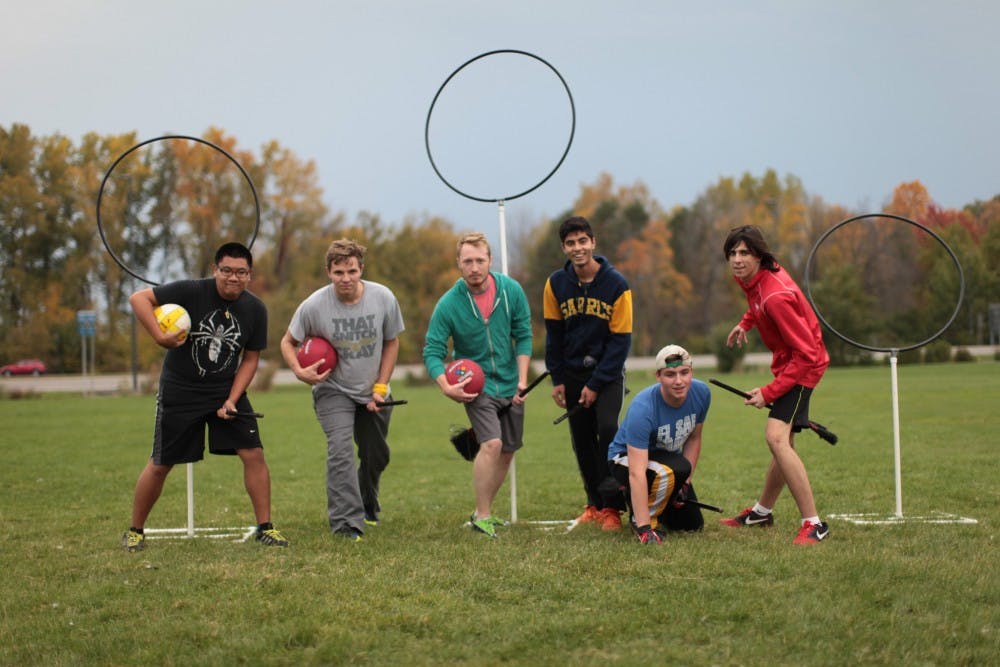One of the hardest hitting, intense club sports at UB practices on a small patch of grass on the side of the Governors parking lot while running around with broomsticks in between their legs.
“There are legitimate injury threats,” said Peter Haering, UB Quidditch Association coach and a UB graduate. “So much so, this year it’s mandated there are trainers on sight for every game. I’ve seen everything from broken hands, to concussions to broken other bones. My friend broke her foot.”
Not what you might expect from a game based off Harry Potter.
The UB Quidditch Association, which plays a real version of the fictional game made famous by the mega-series created by J.K. Rowling, is in its seventh year on campus, but its second year as a Student Association permanent club.
The club embraces its Harry Potter roots, but year by year, the “Harry Potter” notion is slowly diminishing to the point where the only connections between the wizard version and the real version is the broomstick and the logo.
“We want to be known as a gender inclusive, full contact, fast-paced intercollegiate sport that’s so much more than Harry Potter,” Haering said. “They’re actually moving away from brooms. All the good teams use PVC now. The last remnants of the Harry Potter thing is the logo and [US Quidditch] is trying to redo the logo.”
This group of players, who are in the team’s second full season in USQ, sets out to disprove the notion that they are more than just Harry Potter fans. They are genuinely concentrated on the physicality, camaraderie and teamwork aspects of the game.
The club receives roughly $700 per year from SA, members said, which is used for equipment, tournament registration fees and a $150 fee paid toward the USQ.
With only $700 per year to spend, the team hosts bake sales and “Yule Dances,” which gets its namesake from the formals at Hogwarts, to make money. The tournament fees vary between $5-15 per match and that money goes toward paying the referees.
Still, there’s a need for money, even after the fundraisers are complete.
“We can’t go anywhere that’s outside of New York,” Haering said.
But it’s still a huge success from where the team began.
The team began in 2008 as the Ives Pond Quidditch Club and had little affiliation with the school. The team was successful as it competed in the second, third, fourth and fifth Quidditch World Cup. It didn’t take long for the team to begin its demise.
The program took a two-year hiatus after multiple players graduated and left the team with insufficient numbers. It took until 2012 to be brought onto campus and was founded as the UB Quidditch Association. By Spring 2013, the club was up and running with a sufficient amount of players to fill up a team.
The team has roughly 20 members, but there are just 14-15 athletes who travel with the team and play in matches. In order to be eligible to play in a match, a player must attend at least one of three practices a week during the season.
When the sport was founded, one of its main principles was to keep the integrity of Rowling’s version of the game.
But the rules are “ever-changing.”
The positions and the main idea still apply. A seeker still tries to hunt down the golden snitch. The chaser still has to use a “quaffle,” which is actually just a volleyball, and throw it in designated hoops to score points. The main idea of the game is still a seven-on-seven matchup where the ultimate goal is to score points and catch the snitch.
But to make amends for a game played in a wizarding world, rules had to be changed. The “snitch,” which flies by itself in the movies and novels, is actually a person wearing gold shorts with a tennis ball hanging from their back. The ultimate goal is for the seeker to grab the tennis ball on the Snitch’s back.
Perhaps the biggest difference between fantasy and reality is the role of the snitch. In the movies, if a seeker catches the golden ball, that team automatically wins. In the realistic version, if a seeker catches the snitch, the game ends and that team is automatically awarded 30 points.
“It’s different when you play here, especially if the snitch is worth [a lot], the only player that really matters is the seeker,” Haering said. “That had to be changed so everyone can get involved.”
And this sport prides itself on getting people involved.
Quidditch is one of the few sports where a male athlete could be lined up against a female. Men can tackle women and vice versa. The UB Quidditch Association prides itself with inclusion and diversity.
“It doesn’t matter which background you come from sports wise,” said Carley Schulz, a senior electrical engineering major. “If you haven’t played sports before, there’s still a position for you. If we wanted to have a football player play as a seeker, they can very easily tackle. Or you can have a track star who would just run circles around you and you won’t catch them all day.”
In its second season, the team admits its still growing, but it’s on the right track. The team just completed a weekend of play against Alfred and held its own despite having only eight players.
Play will continue play this weekend at Cortland in an unofficial gear-up tournament against Cortland, Rochester and Rochester Institute of Technology in preparation for regional play, which will come later this year.
Jordan Grossman is the Senior Sports Editor and can be reached at jordan.grossman@ubspectrum.com. Follow him on Twitter at @jordanmgrossman





